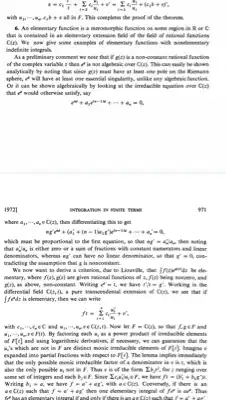In the 1972 paper Integration in Finite Terms by M Rosenlicht he says:
we note that if $g(z)$ is is a non-constant rational function of the complex variable $z$ then $e^g$ is not algebraic over $\mathbb{C}(z).$ [...] it can be shown algebraically by looking at the irreducible equation over $\mathbb{C}(z)$ that $e^g$ would otherwise satisfy,
$e^{ng}+a_1e^{(n-1)g}+\dotsb+a_n=0$
Then differentiating this to get
$ng'e^{ng}+(a_1'+(n-1)a_1g')e^{(n-1)g}+\dotsb+a_n'=0,$
Which must be proportional to the first equation, so that $ng'=a_n'/a_n$, then noting that $a_n'/a_n$ is either zero or a sum of fractions with constant numerators and linear denominators, whereas $ng'$ can have no linear denominator, so that $g'=0,$ a contradiction.
See screencap.
I can't understand this proof. Why should the two equations be proportional? If it were a polynomial $P(y)$ with constant coefficients evaluated at $y=e^g$, then differentiating would give $P'(e^g)e^gg'$ which would still not make the two equations proportional. Anyway the polynomial doesn't have constant coefficients so that's not what's going on here.
Or if you have your own proof of the transcendence of the exponential of a rational function (using differential algebra, not analytic methods) I'd accept that instead.
